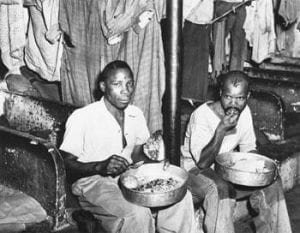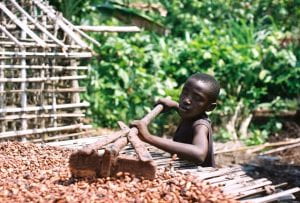I recently spent some time in Cape Town, South Africa. There I had two professors, a husband and wife, both from the area. I quickly noticed that they did not have conventional wedding bands. Rather, they had outlines of wedding bands tattooed on their fingers. Toward the end of the academic quarter I discovered why this was. The mining history in South Africa is a horribly devastating one; black South Africans had been forced into mining jobs, paid little to nothing, and lived in treacherous conditions. The legacy of the mining industry impacts individuals and families to this day. So, my professors abstained from the traditional gold or diamond bands in protest and demonstrated their loving connection with tattooed wedding bands instead.

Two men eating their rations in a shanty town created for miners to live in for most of the year (https://showme.co.za/facts-about-south-africa/history-of-south-africa/the-history-of-south-africa/)
Although this anecdote might seem random or even irrelevant, it is what came up in my mind when engaging with the chocolate contemplative practice. Why? The bitter sweetness of the chocolate, both in taste and through its commodity chain is shared with the wedding band. Both are a sort of celebration, a dessert and a union of love. Both have seen, and still see terrible injustices and human rights abuses in their commodity chains. Both require an immense amount of water and fossil fuels. In both cases, the harvesters and primary suppliers, the “beginning” of these global commodity chains, often never have the opportunity to see the final result of their grueling work—chocolate or wedding bands. Just as the food we consume embodies water, so does our consumption of other goods.

A child rakes cocoa beans on a drying rack, demonstrating the child labor frequently used in chocolate’s commodity chain (https://www.ethical.org.au/get-informed/issues/animal-testing/young-boy-rakes-cocoa-beans-on-a-drying-rack/)
This contemplative practice prodded me to think about our own responsibility in the commodity chain. Should we model ourselves after my professors? Should I stop my father from consuming his ritual post-dinner chocolate bar each night? The contemplative practice did not lead me to a final and perfect answer, but it did allow me to consider one family’s response to the injustices of a different commodity chain, offering me insight into what I believe is the right thing to do. Ultimately, this is the starting point. This is the headspace from which we can begin to consider how to alter our personal behavior to support what is right for the environment and for other human beings.
– Sophie Stein
